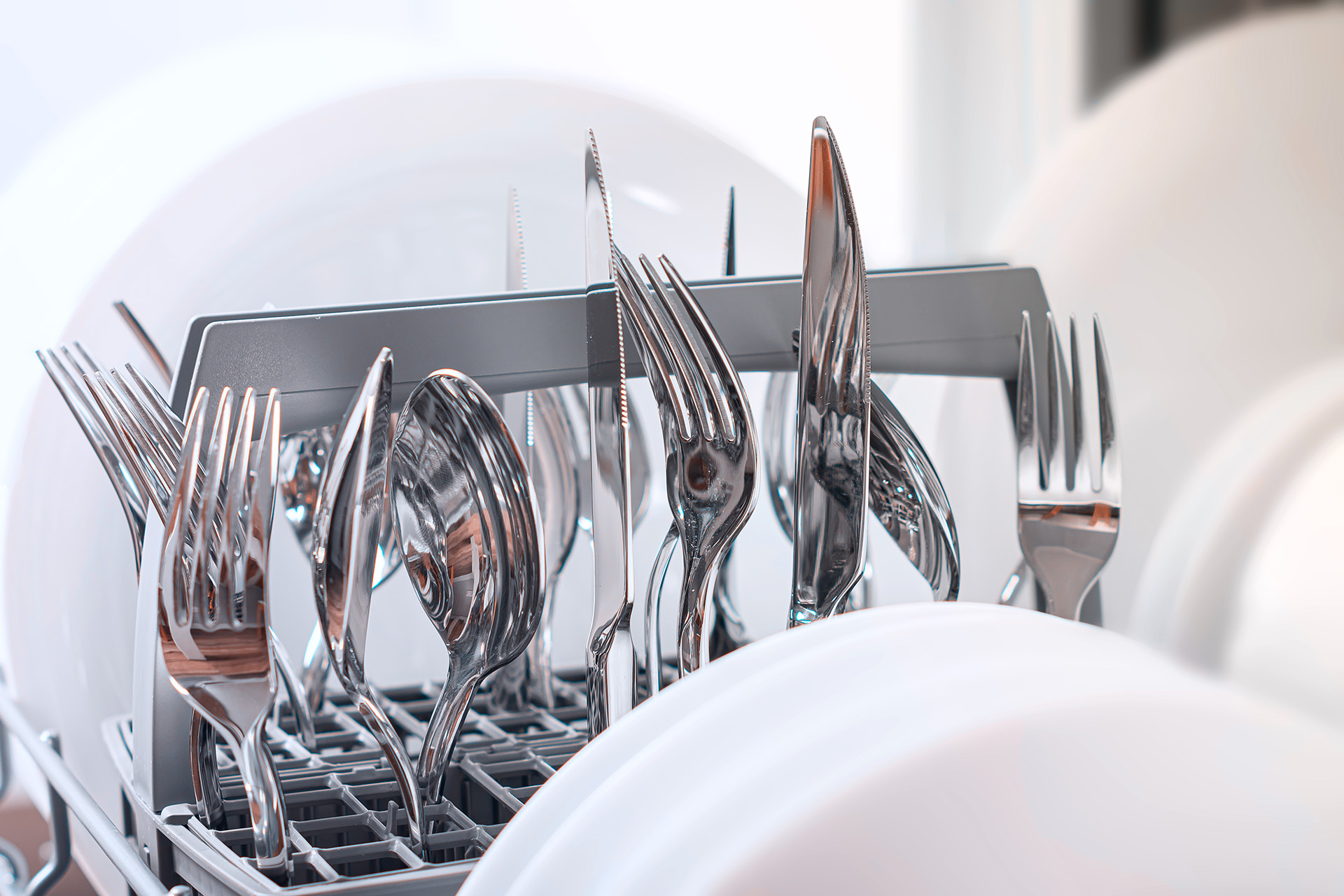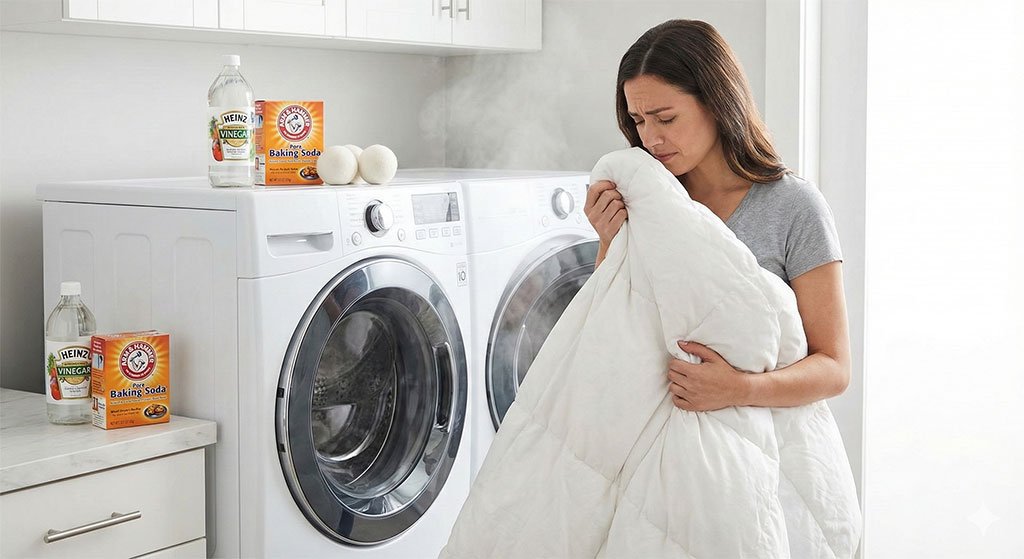Putting sharp knives in a dishwasher can dull the edges over time. The harsh environment and jostling can deteriorate their sharpness.
Sharp knives are essential tools in any kitchen, providing precision and efficiency in cutting tasks. Yet, the convenience of dishwashers poses a threat to their keen edges. Exposing knives to the high pressure and detergents inside a dishwasher can lead to dull blades, reducing their effectiveness and potentially making them hazardous to use.
Proper care is critical to maintaining the integrity of your cutlery. Hand washing and immediate drying, using mild detergents, and avoiding abrasive surfaces, are steps that can extend the life of your knives. Protect your investment by considering alternative cleaning methods that keep blades sharp and ready for the next culinary challenge.

Credit: www.thekitchn.com
Table of Contents
Sharp Knives And Dishwashers: A Harmful Combination?
Many home chefs believe their dishwasher is a kitchen MVP. It tackles dirty dishes with ease. But, can this appliance handle sharp knives? The truth might surprise you. It’s essential to dive into whether dishwashers truly affect the performance and sharpness of your knives. Let’s explore this kitchen quandary.
The Impact Of Dishwashing On Knife Edges
Putting sharp knives in a dishwasher exposes them to harsh conditions. This can lead to dullness and damage. Here’s why:
- Harsh detergents can cause corrosion.
- High temperatures may make metal brittle.
- Water jets force knives to hit other items, causing nicks.
Maintaining a knife’s edge requires gentle care. Dishwashers fail to provide this, leading to a quicker need for sharpening.
Common Misconceptions About Knives And Dishwashers
Some people think modern dishwashers are safe for knives. They hold two main beliefs.
Misconception | Reality |
|---|---|
Dishwashers are gentle. | They can be rough on delicate items. |
Stainless steel is immune to damage. | It can still corrode and dull over time. |
Hand washing is the best way to keep knives sharp longer. It protects the precision edge from the hazards of the dishwasher.
The Anatomy Of A Sharp Knife
The Anatomy of a Sharp Knife is crucial when understanding its performance and maintenance, including how it might be affected by a dishwasher. Knives are tools with a history as old as time, and their efficiency lies in their sharpness. A well-maintained knife can mean the difference between a swift, precise cut and a dangerous, inefficient one.
Materials And Construction Of Quality Knives
Top-notch knives boast materials designed for longevity and strength. The blade is usually high-carbon stainless steel, offering a balance between sharpness and resistance to rust. Let’s break it down:
- Handle: Ergonomically designed for grip and comfort.
- Blade: High-carbon steel ensures a lasting edge.
- Bolster: Provides balance and heft for safe handling.
- Rivet: Securely joins the handle and blade.
- Spine: The blade’s top, adding stability and weight.
- Edge: The sharpened part of the blade that does the cutting.
- Point: The tip of the knife used for piercing.
- Heel: The rear part of the edge, used for tough cutting tasks.
Quality knives are precision-crafted tools with each part playing a pivotal role in performance.
What Makes A Knife Sharp: Exploring The Edge
The edge of a knife is where the magic happens. A microscopic view would show you a series of teeth-like serrations that catch and slice through material. Here’s how sharpness is achieved:
- Grinding and sharpening: The blade is ground to create an edge.
- Honing: Regular honing maintains the edge’s sharpness.
- Polishing: Gives the blade a razor-like edge.
Sharp knives require delicate care to maintain their precision edges. They can be dulled by hard surfaces, including those within a dishwasher. Proper storage and manual cleaning will preserve their sharpness for safer and more efficient cutting.
Dishwasher Dynamics: Inside The Machine
Many people ponder over dishwasher safety for their sharp knives. Understanding what happens inside this kitchen helper is crucial. Lets dive into the workings of a dishwasher and see how it could impact your cutlery.
How Dishwashers Work
Think of your dishwasher as a mini hurricane targeting grime. Hot water and detergents blast from spray arms to clean the dishes. The cycle involves:
- Rinsing: Removes loose food particles.
- Washing: Heated water and detergent clean the dishes.
- Drying: Heat dries the dishes, sometimes using a fan.
Factors That May Affect Cutlery
Can your sharp knives withstand this storm? Several factors come into play:
- Water Pressure: Intense for cleaning, possibly harsh on edges.
- Detergents: Chemicals can corrode metal over time.
- Movement: Jostling can blunt the blade.
- Temperature: Heat can weaken knife integrity.
Factor | Risk to Cutlery |
|---|---|
Water Pressure | Potential edge damage |
Detergents | Corrosion risk |
Movement | Blunting from movement |
Temperature | Structural integrity concern |
Care for sharp knives calls for understanding these machine dynamics. Choosing to hand wash might save the edge.
The Culprits Of Dullness
The Culprits of Dullness in kitchen knives might seem mysterious at first. Yet, certain everyday practices contribute significantly to the blunting of those sharp edges. This segment peels back the layers on what really causes knives to dull, even when one might be using a dishwasher with the best intentions.
Abrasive Detergents And Knife Edges
Abrasives in detergents are the first culprits. These gritty substances act as tiny sandpapers, grinding away at a knife’s precise edge. Over time, this constant scouring dulls the blade, stripping it of its sharpness and efficiency. Consider this:
- Detergents contain chemicals designed to tackle tough stains.
- Those ingredients can erode the knife’s edge.
Choosing a gentler detergent or hand-washing can preserve a knife’s keen edge longer.
Collisions During The Wash Cycle: More Harmful Than We Think?
The wash cycle involves more than just soap and water. Knives can collide with other utensils, causing nicks and micro-abrasions. These minor but repeated impacts can have a significant effect on the blade’s sharpness. Reflect on these points:
- Water pressure can cause knives to knock against other items.
- The dishwasher’s vibrations can lead to unexpected contact.
To minimize risk, secure knives in a designated utensil holder or consider hand-washing.
Expert Opinions On Dishwashers And Knives
An often-debated question in the world of home cooking revolves around the care of kitchen knives. Many homeowners wonder whether placing sharp knives in a dishwasher leads to dulling. To shed light on this matter, let’s explore the insights and recommendations provided by culinary experts and knife manufacturers alike.
Culinary Professionals Weigh In
Chefs and seasoned cooks offer invaluable knowledge from their hands-on experiences. Here’s what they say:
- Hand washing maintains sharpness: Direct contact with other utensils can damage knife edges.
- Manual drying prevents rust: Dishwasher heat may promote oxidation on high carbon blades.
- Instant care extends life: Cleaning knives right after use protects against persistent stains and smells.
Knife Manufacturers’ Recommendations
Those who create knives understand best how to maintain them. Here are their tips:
Knife Type | Recommended Care |
|---|---|
Stainless Steel | May withstand dishwashers; hand wash for longevity. |
Carbon Steel | Avoid dishwashers; hand wash with gentle soap. |
Ceramic | Hand wash only to prevent chipping. |
All manufacturers stress careful handling. They recommend against dishwasher use to preserve the knife’s edge and finish.

Credit: www.finishdishwashing.com
Maintaining Sharpness: Best Practices
Keeping kitchen knives sharp isn’t just about slicing with ease. It’s about precision and safety. A sharp knife is less likely to slip and cause injury. So, can a dishwasher spell doom for your sharp blades? The truth is, the high-pressure water, heat, and harsh detergents can harm knife edges. But fret not. There are ways to keep your knives in tip-top shape after every use.
Manual Cleaning Techniques
Hand-washing your knives is the key to preserving their sharpness.
- Use warm, soapy water to clean the knife carefully.
- Avoid scraping the edge against other utensils.
- Use a non-abrasive sponge to protect the edge.
- Dry immediately with a soft cloth to prevent rust.
Sharpening And Storage Tips For Long-lasting Edges
Proper care extends beyond washing. Sharpen and store your knives correctly.
- Hone regularly using a honing rod to maintain an edge.
- Sharpen occasionally. Use a whetstone or seek professional help.
- Avoid hard surfaces. Cut on wood or plastic, not glass or metal.
- Store safely:
Method | Benefits |
|---|---|
Magnetic Strip | Limits contact, avoids dulling. |
Knife Block | Keeps edges protected. |
Sheaths or Guards | Prevent nicks and cuts. |
Alternatives To The Dishwasher
Seeking longevity in your blades often means bypassing the dishwasher. Let’s explore effective alternatives that keep your knives sharp and shining. Understanding these methods can save you from the disappointment of dulled knives.
Hand Washing Vs. Machine Washing
Hand washing knives protects them from the harsh conditions inside a dishwasher. Water temperature and detergent can damage knife blades.
With hand washing, you control the cleaning process. Use warm water and a mild detergent. Gently wipe the blade with a soft sponge. Dry each knife immediately with a towel to prevent rust.
In contrast, machine washing can lead to issues. Knives can knock against other utensils. This causes them to dull quicker. Corrosive dishwasher detergents also contribute to dulling.
Innovative Cleaning Tools For Knives
Forget the dishwasher. Look for tools designed to keep knives in top shape. Consider these options:
- Magnetic knife strips: Keep knives off counters and prevent dulling blades.
- Knife blocks: Store your blades safely and maintain a sharp edge.
- Blade guards: Protect the edges when not in use.
- Professional knife sharpeners: Use them regularly to sharpen blades.
- Manual dishwashing tools: Try a brush or cloth that won’t scratch.
With the right tools and techniques, keeping your knives sharp is simple. Ditch the dishwasher and show your knives the care they deserve.
:max_bytes(150000):strip_icc()/Simply-Recipes-Dishwasher-LEAD-01-3bb23663efcc4964876bf37075f49822.jpg)
Credit: www.simplyrecipes.com
The Verdict On Dishwashers And Knife Care
Sharp knives are essential for every cook’s arsenal. But does placing these prized tools in a dishwasher compromise their sharpness? This question stirs debate among culinary enthusiasts and chefs alike. Let’s unravel the mystery with some practical insights.
Summarizing The Evidence
Research and experience suggest that dishwashers can indeed dull sharp knives. The combination of high water pressure, harsh detergents, and jostling against other utensils during the wash cycle poses a risk to the fine edges of high-quality blades. Additionally, the dishwasher’s hot and wet environment can cause wooden handles to warp and blades to corrode, further diminishing their quality and effectiveness.
- Water Pressure: Possible damage from potent jets.
- Detergents: Chemicals may corrode knife blades.
- Collisions: Knocking can blunt the edge.
- Heat and Moisture: Risks of rusting and warping.
Making The Best Choice For Your Cutlery
For those who value their knives, manual washing is the way to go. Gentle soap, warm water, and a soft sponge protect the blade’s sharpness, ensuring your knives remain in top condition for an extended period. Hand drying immediately after washing prevents rust and maintains handle integrity. Choose this method to give your knives the care they deserve.
Dishwasher | Manual Washing |
|---|---|
High risk of dulling | Preserves sharpness |
Chemicals may corrode blades | Gentle on metal |
Potential for damage | Controlled cleaning environment |
Can cause handles to warp | Protects handle material |
Opt for a dedicated knife block or a magnetic strip to store your utensils. Store them safely where they won’t be nicked or blunted. This way, you safeguard not only the knives but also the investment and culinary joy they represent.
Frequently Asked Questions
Do Dishwashers Dull Sharp Knives?
Yes, dishwashers can dull sharp knives due to high water pressure and harsh detergents. Hand washing is recommended to maintain sharpness.
Can You Put Henckel’s Knives In The Dishwasher?
Henckel’s knives are not recommended for dishwasher cleaning; hand washing preserves their sharpness and finish.
Is It Safe To Put Dirty Steak Knives In The Dishwasher?
Putting dirty steak knives in the dishwasher may dull the blades. Hand wash them for safety and to maintain sharpness.
Is It A Myth To Put Silverware In The Dishwasher?
It’s not a myth; you can put silverware in the dishwasher. However, avoid mixing stainless steel and silver to prevent damage. Always check manufacturer’s recommendations for your silverware’s dishwasher safety.
Bottom Line
Maintaining sharp knives is crucial for any kitchen. Washing them in dishwashers can lead to dullness over time. Opt for hand washing to preserve your blades’ edge and ensure longevity. Remember, proper knife care keeps your culinary tools at their best, safeguarding your investment and cooking prowess.
Keep slicing with precision!


